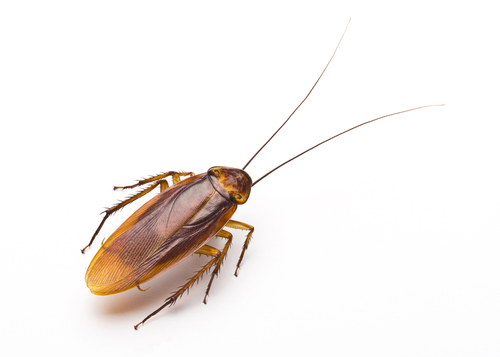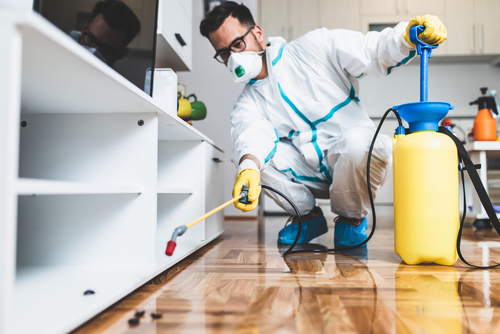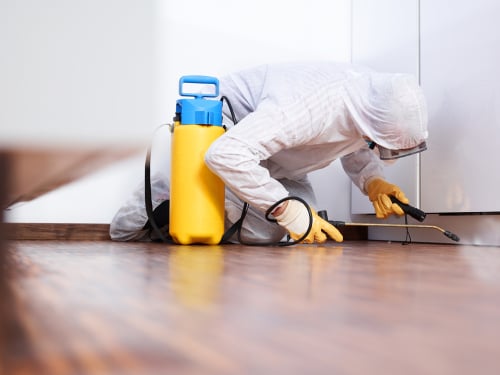No one likes to think about the chance of a pest infestation in their home. Pests in rental properties can present even more significant challenges. Unsure of your responsibility as a landlord? A local property management company can guide you through the signs of infestation plus how to handle one if it arises. It’s important to educate tenants on what to look out for, so check out these tips below.

Signs of a Pest Infestation
- Droppings: Pest droppings can be any fecal droppings or urine trails. However, waste from small pests such as roaches or bed bugs is harder to spot. Clean often and examine floors, walls, bedding, and furniture for evidence of pest droppings.
- Nesting: Rodents, especially, will make nests from anything they find. Paper, grass clippings, and leaves can all be useful to rodents. Performing regular inspections of common nesting sites such as between walls and secluded low-traffic areas will help prevent rodent nests.
- Grease Tracks: Rodents tend to travel along walls, leaving a greasy trail wherever they have been. Keep an eye out for these trails along with droppings as signs of rodent presence.
- Physical Damage: Rodents love to chew! Therefore, pay close attention to any holes and gnaw marks. These are an indication of a potential pest infestation. If tenants notice any unexplained property damage, they should contact their landlord or Property Management Company immediately.
How to Treat and Prevent Pest Infestations
Rodents
- Remove food and water sources
- Remove items that can provide them shelter
- Seal holes inside and outside the home
- Remove potential rodent nesting sites, including leaf piles and deep mulch.
Cockroaches
- Caulk any gaps where roaches can infiltrate
- Use weather stripping on doors and window seals
- Utilize gel bait under baseboards and in crevices to get rid of roach colonies
- Bait stations attract cockroaches into stations and either use poison or glue traps
Bedbugs
- Thoroughly clean bedding, clothing, and all soft surfaces with hot water and dry them on the highest dryer setting.
- Use a stiff brush on the mattress to remove bedbugs and eggs before vacuuming.
- Vacuum bedframe and mattress as well as surrounding area frequently.
- Immediately place the vacuum bag in another plastic bag and place it in outdoor garbage.
- Encase mattress and box springs with a tightly woven, zippered cover to keep bedbugs from entering or escaping.
- Seal off any cracks in walls or peeling wallpaper to eliminate places bedbugs can hide.
- Remove clutter around the bed.
When to Call Professionals for a Pest Infestation
A pest infestation requires immediate action to treat and prevent the problem from escalating. Responsibility for this treatment varies based on the type of property or specific wording in the lease.
 Landlords need to take action when a problem is reported in a multi-family building either in a particular unit or common area. On the other hand, tenants are responsible for maintaining a pest-free environment in single-family units. Below we examine a few guidelines for knowing when to call for professional help.
Landlords need to take action when a problem is reported in a multi-family building either in a particular unit or common area. On the other hand, tenants are responsible for maintaining a pest-free environment in single-family units. Below we examine a few guidelines for knowing when to call for professional help.
- If there are children in the home: Pests carry germs and diseases, plus the chemicals used to treat them can be harmful. Exterminators have options for safely treating infestations while protecting all household occupants.
- Despite your best efforts, the infestation gets worse or does not go away: Not all home remedies or DIY solutions will eradicate a pest infestation. If you have indications that the problem may be more than just a mouse, seek professional advice.
- Infestation clears up but then reoccurs: If despite various efforts, infestations reappear, that likely means they were never really gone. It can be challenging to cover all areas pests can infiltrate without professional help.
- Dealing with larger pests such as rats: Rats are large rodents that can do damage to your home and be quite scary. Primarily active at night, these can be difficult to eradicate, and you should seek professional extermination.
Benefits of Regular Extermination Efforts
For many landlords, pest control and management are a big concern. Regular inspections and treatment with a qualified exterminator can pay off big in the long run. When an infestation occurs requiring professional treatment, costs can quickly escalate. However, regular maintenance to prevent such issues can be far more economical, then you might think. Consider these benefits of ongoing pest control below.
- Less Stress: Some DIY methods due to work, but leaving it to the experts takes all of the stress off of you. Rest assured, the professionals have it covered.
- Safe and Sound: Regular inspections will protect not only your tenants but also the property. Pests can cause holes, damage, and destruction in a relatively short time. Experts will stave off that threat and leave you prepared should an issue arise.
- Significant Savings: The cost of emergency or extensive treatment can be a drastic expense no one is prepared for. Regular maintenance contracts are more cost-effective options for landlords and worth the consideration.
Dealing with a pest infestation at your Camp Hill rental home property is challenging, but with the proper tools and professional help, it can be remedied. As a landlord or tenant, preventing pest infestations is a vital part of protecting the property. A local rental property management company can guide you through the signs of infestation plus how to handle one if it arises. Contact Bay Property Management Group today!

